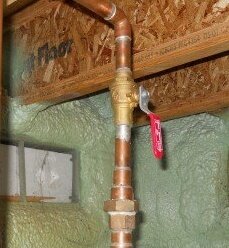Preventing Plumbing DIsasters in Your Home
One of the things we see a lot of in the plumbing business is water damage. Once a building has a leak, it can cause tremendous damage before anyone realizes what has happened. While no one can predict an accident, some things will minimize the potential for leaks, for the spread of leaks, and, ultimately, for the amount of water damage.
Here are some things you can monitor to keep your plumbing in good working order:
Your pipes
Your pipes are built to last the life of your home when properly maintained. But outside forces can cause pipes to leak. Earthquakes, rodents, air in the lines, and even over-zealous repairs of inexpert plumbing and appliances can cause leaks. So, if you have any of these problems, keep a careful eye out for moisture around your pipes.
Appliance supply lines
Every water-using appliance has pipes, and 99 percent of the time, those lines are plastic tubing. Therefore, it’s important to check these lines frequently. Watch for rust, discoloration of the pipe or surrounding material, or calcium build-up. When you replace these lines, consider upgrading to flexible stainless steel.
Hot water heater
Follow the maintenance instructions on your hot water heater carefully. A hot water heater can cause serious damage, depending on where it’s located. A hot water heater should be checked by a professional plumber every few years. If it’s in a location where a leak would be truly devastating, consider a leak detector.
Drainage systems
Sinks, garbage disposals, showers, tubs, and toilets should all be kept debris-free. If you have a family member who is an over-enthusiastic toilet tissue consumer, consider installing a bidet.
Water damage
If you see water damage or moisture on your ceiling (if there are overhead pipes), walls, flooring, or other surfaces, call a plumber immediately. Water can do some pretty unusual maneuvering when it’s inside a wall. When you find a leak, it isn’t necessarily caused by the nearest pipe.
Tools you can use to fight back:
Everyone who lives in your home should know where the main water shutoff valve is located. In addition, if you have a situation that you deem risky, such as a water heater located in the main part of the house or frequent earthquakes, leak detectors can be extremely effective.
If you have a smart home hub, you can buy a moisture detector like the Samsung SmartThings Water Leak Sensor, which will notify you on your phone, emit a siren and lights in the event of moisture.
Zircon 68637 Leak Alerts also have an alarm and lights, and are battery operated. These can also be used as flood alerts.
The important thing is to maintain water delivery systems adequately. While having a plumber do a maintenance check on your home is an expense, it pales in comparison to a flood event.
With over 25 years of experience, American Discount Plumbing has offered expert plumbing service and repair in Phoenix, Arizona, and surrounding cities at affordable rates for both residential and commercial properties. We are a licensed, bonded, and insured plumbing company offering 24-hour emergency service. We provide lasting general plumbing, water leak detection and repair, toilet repair, pipe repair, and water heater repair or replacement solutions. Call 602-883-2787 today!



